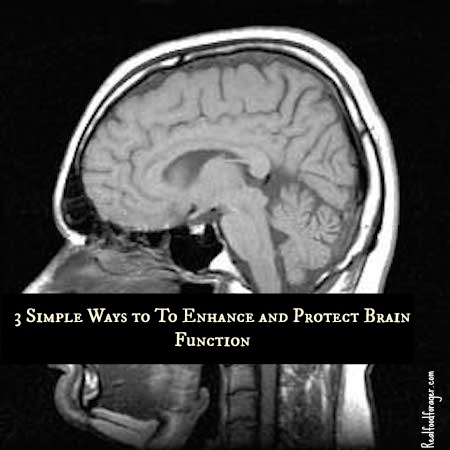
They used to teach that brain cells were not able to regenerate. Finally, in 1998 neurologist Peter Erickson reported in Nature Medicine, that there are human neural stem cells that can regenerate into brain neurons. With this, the new science of neuroplasticity was born. While this concept may sound complicated (and it is) it has lead to our understanding of simple ways to protect and enhance brain function as we age.
The next exciting discovery was of the protein called brain-derived neurotrophic factor (BDNF). This important substance not only has a key role in creating new neurons, it also can protect existing neurons and enhance their ability to connect with other neurons. This connectivity is vital for higher brain functions such as thinking and learning.
At any moment of the day, because of BDNF, your brain has the ability to regenerate the neuronal cells that keep you sharp and focused.
How To Increase BDNF
You cannot buy BDNF as a supplement, but your body has the amazing ability to make BDNF throughout your life. There are 3 important lifestyle actions that you can take to support the production of BDNF!
Sunlight Supports the Production of BDNF
We know how important vitamin D is to hormone production. We know that the best way to get vitamin D is for the body to make it from sunshine on the skin. This is why I stopped using sunscreen, and now expose my skin to the sun, within reason so that I do not burn, and in small increments as much as I can.
When cholesterol in the skin is irradiated with sunlight, the active form of vitamin D is made. Healthy vitamin D levels are needed for optimal cardiovascular health, immune system health and blood sugar regulation as well as bone, teeth and skin health and so many other benefits.
It has been found that serum BDNF varies according to seasons and sunlight exposure. This study, called the Netherlands Study of Depression and Anxiety (NESDA) involved 2,851 people. It was published in PLOS ONE in 2012 and it investigated the blood levels of BDNF according to the spring-summer period and the autumn-winter period.
The researchers found variations according to these seasons, with increasing concentrations in the spring-summer period and decreasing concentrations in the autumn-winter period.
The researchers concluded that this seasonal variation was an important factor in the regulation of BDNF expression and may lead to a new understanding of seasonal dependent changes in behavior and illness such as depression.
I’m so excited to find out that sunlight exposure is necessary for BDNF production! Yet another reason to sit in the sun – it helps the brain!
Aerobic Exercise Enhances BDNF
It has been shown that the part of the brain involved in memory, the hippocampus, will actually shrink. This structural change is associated with memory loss. There are several reasons this will happen, such as high grain and sugar intake.
In a study funded by the National Institute of Health and published in the New England Journal of Medicine in 2013, researchers found that carbohydrates dramatically increased blood sugar and increased free radicals.
In this study published in Neurology in 2012 the researchers found higher fasting glucose associated with atrophy in the brain memory center — the hippocampus. This was measured via brain scans and correlated with fasting blood glucose. The researchers found that even at low levels of blood glucose — 108, the 110 subjects were already losing their memory centers.
We need to address the actual cause of the shrinking of the memory center of the brain — the hippocampus. It is affected by free radicals, which cause oxidative stress — just like a piece of iron rusting and disintegrating — the brain cells diminish when under oxidative stress. Oxidative stress damages fat, proteins and DNA.
Luckily, your body can regenerate these neurons naturally through aerobic exercise. This study from Proceedings of the National Academy of Sciences, 2010, involved 120 older adults, half of whom were given a stretching program 3 times a week and the other half were given an aerobic exercise 3 times a week.
After one year the researchers found that aerobic exercise training not only increased the size of the anterior hippocampus, leading to improvements in spatial memory, it also increased blood levels of BDNF. At the same time, the stretching group actually showed a decline in hippicampal size, a decrease in blood BDNF and memory loss.
The researchers concluded that,
These results clearly indicate that aerobic exercise is neuroprotective and that starting an exercise regimen later in life is not futile for either enhancing cognition or augmenting brain volume.
Some folks talk about chronic cardio being bad for you. After reading this, I’m glad I still do plenty of cardio exercise each day!
DHA Increases BDNF
Did you know that more than two thirds of the dry weight of your brain is fat? Of that, one quarter is DHA. Additionally, DHA is an important component of the cell membranes, specifically to the synapses that are important to the connectivity of the neurons.
Furthermore, DHA is a mediator of inflammation. It can counter inflammation in the gut that is brought on by poor dietary choices such as sugars, grains and allergens.
Importantly, DHA has been found to regulate the gene expression for the production of BDNF.
In this study published in Alzheimer’s and Dementis in 2010, called The Memory Improvement with Docosahexaenoic Acid Study (MIDAS). The researchers found that DHA taken for six months improved memory and learning in healthy, older adults with mild memory complaints.
This was a randomized, double-blind, placebo-controlled study to evaluate the effects of DHA — the principle omega-3 fatty acid in the brain — on improving cognitive functions in healthy older adults with age-related cognitive decline.
The researchers concluded that,
Twenty-four week supplementation with 900 mg/d DHA improved learning and memory function in ARCD and is a beneficial supplement that supports cognitive health with aging.
While I have to add up all the milligrams of DHA I get each day, I am sure I am getting plenty as I take fermented cod liver oil, and eat fatty fish almost every day.
If you don’t eat a lot of fatty fish like salmon, sardines or herring, you can take this DHA supplement.
These simple lifestyle changes can add quality and focus to your brain and memory. Will you incorporate one, two or all of them? Leave a comment and let me know what you are doing for your brain!
Source: Grain Brain
Shared at: Thank Your Body Thursday, Fight Back Friday, Allergy Free Wednesday
Photo Credit
The owner of this website is a participant in the Amazon Services LLC Associates Program, an affiliate advertising program designed to provide a means for sites to earn advertising fees by advertising and linking to Amazon properties including, but not limited to, amazon.com, endless.com, myhabit.com, smallparts.com, or amazonwireless.com. Disclaimer
Tropical Traditions Gold Label Virgin Coconut Oil

Tropical Traditions Gold Label Coconut Oil is a product I use every day.










{ 1 comment… read it below or add one }
There are several great ways to enhance your brain, and the ones you mentioned above are excellent. In my opinion, another great way to enhance the brain is through brain training. It helps stimulate and increase brain performance and cognitive skills. Thanks for sharing your post!
{ 1 trackback }